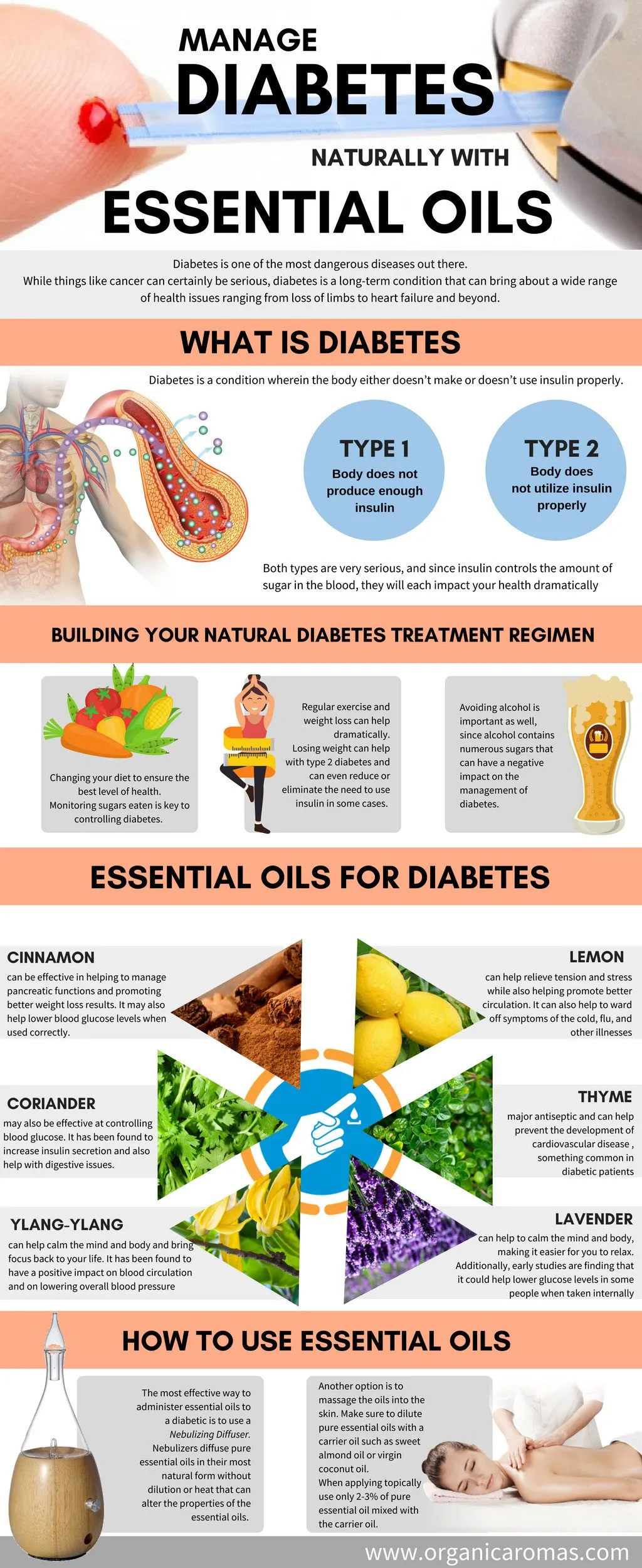Using Essential Oils to Support Your Diabetes Management
Diabetes is a formidable adversary in the realm of chronic diseases, posing a continuous threat to our health.
Unlike some conditions like cancer, which may manifest suddenly, diabetes is a long-term condition that stealthily advances, bringing with it an array of health complications ranging from limb loss to heart failure and beyond.
To live the longest and healthiest life possible, diabetes must be managed with the guidance of a medical professional. Nevertheless, there are natural remedies and lifestyle changes that can significantly contribute to effective diabetes management.
In this article, we delve into the world of essential oils and explore how they can be integrated into a natural diabetes management regimen.
Understanding Diabetes

Diabetes Mellitus, commonly referred to as diabetes, is a chronic metabolic disorder characterized by elevated blood sugar levels over an extended period. There are two primary types: Type 1 and Type 2 diabetes, each with distinct causes, symptoms, and complications.
Type 1 Diabetes
Type 1 diabetes, previously known as juvenile diabetes or insulin-dependent diabetes, is an autoimmune condition that results from the immune system's attack on insulin-producing beta cells in the pancreas. This assault impairs insulin production, leading to elevated blood sugar levels.
- Causes: The exact cause of Type 1 diabetes remains elusive, but it is believed to result from a combination of genetic predisposition and environmental factors, including viral infections.
- Symptoms: Common symptoms include frequent urination, increased thirst and hunger, unexplained weight loss, fatigue, and blurred vision.
- Complications: Long-term complications can impact multiple organs, including the heart, kidneys, nerves, and eyes. It also increases the risk of stroke and Alzheimer's disease.
- Affected Demographics: Type 1 diabetes can develop at any age but is frequently diagnosed in children, adolescents, and young adults.
- Management: Management includes regular insulin therapy, blood sugar monitoring, a healthy diet, and regular physical activity.
Type 2 Diabetes
Type 2 diabetes, previously known as adult-onset or non-insulin-dependent diabetes, is a chronic condition that affects the body's ability to metabolize glucose effectively.
In this type, the body either resists insulin's effects or fails to produce enough insulin to maintain normal glucose levels, leading to insulin resistance.
- Causes: Type 2 diabetes is linked to genetics, lifestyle factors such as sedentary behavior and obesity, and insulin resistance.
- Symptoms: Symptoms are similar to those of Type 1 diabetes but are often less noticeable, leading to delayed diagnoses in many cases.
- Complications: Similar to Type 1 diabetes, Type 2 diabetes can lead to complications such as nerve pain and slow wound healing. It may also result in hearing impairment and obstructive sleep apnea.
- Affected Demographics: While it can occur at any age, Type 2 diabetes is more common in people over 45 and those who are overweight or obese.
- Management: Management includes lifestyle changes like healthier eating, regular physical activity, and weight loss. Diabetes medications or insulin therapy may be necessary if lifestyle changes are insufficient.
Gestational Diabetes

Gestational diabetes is a specific type of diabetes that occurs exclusively during pregnancy, resembling Type 2 diabetes in the way the body becomes resistant to insulin, the hormone responsible for regulating sugar movement into cells.
- Causes: Gestational diabetes develops due to hormonal changes during pregnancy that impair insulin's action in the body.
- Symptoms: Most women with gestational diabetes are asymptomatic, with the condition often detected through routine blood sugar testing.
- Complications: Untreated gestational diabetes can lead to premature birth, high birth weight in infants, an increased risk of type 2 diabetes in mothers, and a higher likelihood of obesity and diabetes in babies later in life.
- Affected Demographics: While any woman can develop gestational diabetes, some women are at higher risk due to factors such as age, family history, excessive weight, nonwhite race, and previous delivery of a large baby.
- Management: Treatment focuses on maintaining blood glucose levels similar to those in pregnant women without gestational diabetes. It includes specialized meal plans, physical activity, and sometimes insulin injections. Blood sugar levels typically return to normal after childbirth, but the risk of developing Type 2 diabetes later in life remains.
Building Your Natural Diabetes Treatment Regimen
In the quest to manage diabetes effectively, essential oils represent just one component of a holistic approach. Alongside blood sugar monitoring and insulin use, consider incorporating the following steps into your regimen:
- Dietary Changes: Carefully monitor and manage your sugar intake. Your diet plays a pivotal role in controlling diabetes.
- Regular Exercise and Weight Loss: Engage in regular physical activity and strive for weight loss if you have Type 2 diabetes. Weight loss can even reduce or eliminate the need for insulin in some cases.
- Avoid Alcohol: Alcohol contains sugars that can negatively impact diabetes management. Therefore, it's crucial to limit or eliminate alcohol consumption.
While these natural steps can be instrumental in managing diabetes, it's paramount to consult with a medical professional for personalized guidance. Natural remedies should complement, not replace, medical attention and prescribed treatments.
Essential Oils for Diabetes
Can essential oils be used to support diabetes management naturally? Yes!
Essential oils are concentrated plant extracts often utilized in aromatherapy and complementary therapies. Some research suggests that they may offer potential benefits for managing diabetes, primarily in alleviating symptoms or complications associated with the disease.
However, it's vital to underscore that essential oils cannot cure diabetes or serve as substitutes for conventional treatments.
Here are some ways in which essential oils might aid in diabetes management:
- Blood Sugar Regulation: Specific essential oils such as cinnamon, fenugreek, and cumin are believed to help regulate blood sugar levels. Research has shown that a blend of cinnamon, fenugreek, and oregano oils improved insulin sensitivity and fasting glucose levels in diabetic rats in a 2017 study.
- Stress Reduction: Stress significantly influences sugar management. Essential oils like lavender, chamomile, and ylang-ylang possess calming properties and can be employed in aromatherapy to reduce stress and anxiety.
- Managing Complications: Diabetes can lead to various complications, including nerve pain and impaired wound healing. Some essential oils like geranium, eucalyptus, and frankincense may help relieve neuropathic pain. Lavender and tea tree oils have antimicrobial properties that can facilitate wound healing.
If you're contemplating the use of essential oils as part of your diabetes management plan, it's essential to do so under the guidance of a healthcare provider to ensure safety and effectiveness.
Moreover, remember that essential oils are highly concentrated and can cause skin irritation or allergic reactions in some individuals. Always dilute essential oils before use, and never ingest them without professional guidance.
Let's explore some of the most beneficial essential oils for diabetes:
- Cinnamon: Cinnamon essential oil is one of the most extensively studied oils in terms of diabetic management. Research has shown its effectiveness in enhancing pancreatic functions, promoting weight loss, and potentially lowering blood glucose levels when used correctly.
- Coriander: Coriander essential oil may also be effective in controlling blood glucose levels. It has been found to increase insulin secretion and assist with digestive issues.
- Ylang-Ylang: This essential oil is ideal for diabetics who experience irritability or mood swings. It can help calm the mind and body while improving blood circulation and lowering overall blood pressure—two common concerns among diabetics.
- Lemon: Lemon or lemongrass essential oils can relieve tension and stress, enhance circulation, and support the body in warding off cold and flu symptoms. These benefits can facilitate the healing process for diabetics dealing with various conditions.
- Thyme: Thyme essential oil possesses significant antiseptic properties and may help prevent the development of cardiovascular disease, a common concern among diabetic patients. However, it should be used cautiously by individuals with high blood pressure.
- Lavender: Lavender essential oil can aid in calming both the mind and body, promoting relaxation. Preliminary studies suggest that it may help lower glucose levels in some individuals when taken internally, although this practice should only be undertaken with guidance from a trained professional.
- Lemon Balm: Lemon balm oil is another valuable option with potential benefits for diabetes management.
How to Use Essential Oils

To effectively administer essential oils for diabetes management, consider the following methods:
- Nebulizing Diffuser: Utilizing a nebulizing diffuser is the most efficient way to disperse essential oils. These devices diffuse pure essential oils in their natural form without dilution or heat, preserving their properties.
- Topical Application: Dilute pure essential oils with a carrier oil such as sweet almond oil or virgin coconut oil before applying them to the skin. Use only 2-3% of pure essential oil mixed with the carrier oil for safe topical use.
Each of these options can be beneficial, but they should be integrated into a comprehensive diabetes management plan. Always consult with your healthcare provider when exploring natural alternatives, and remember that essential oils should never replace medical attention or prescribed treatments.
Benefits of Using Essential Oils for Diabetes Management
Incorporating essential oils into your diabetes management regimen can offer several potential benefits:
- Blood Sugar Control: Certain essential oils, such as cinnamon and coriander, may help regulate blood sugar levels, particularly when used internally under professional guidance.
- Inflammation Reduction: Type 2 diabetes is often associated with increased inflammation. Lemon balm, containing antioxidant flavonols, may help reduce this inflammation.
- Stress Management: Managing a chronic condition like diabetes can be stressful. Essential oils used in aromatherapy, such as lavender, can help alleviate this stress and promote a sense of calm.
- Antimicrobial Properties: Certain essential oils, including lavender, possess anti-inflammatory, antibacterial, antiviral, and antifungal properties that can contribute to the prevention of complications related to diabetes.
- Enhanced Sensitivity to Insulin: A blend of essential oils has demonstrated the ability to lower circulating glucose levels and enhance insulin sensitivity, offering promise as a natural component of diabetes treatment regimens.
While essential oils hold potential benefits for individuals managing diabetes, they should always be employed as complementary elements and never as replacements for traditional treatments.
As with any complementary therapy, it's essential to have a thorough discussion with a healthcare provider to determine the suitability of essential oils for your specific situation.
Safety is paramount when using essential oils, and they should be approached with caution, always diluted appropriately for skin application, and never ingested without professional supervision.
Essential oils can be valuable tools in your diabetes management toolkit, but they should always be wielded wisely and in tandem with medical guidance.
